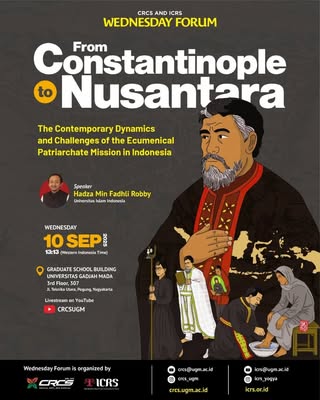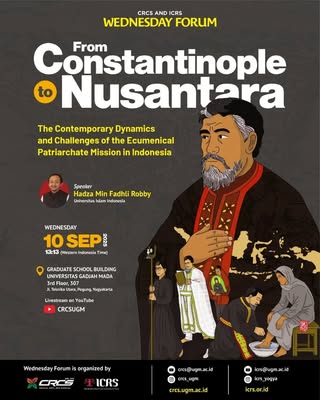
Hongsok Lee
The Wednesday Forum on September 4, 2024, discussed the relationship between religion and the environment. The presenter, Iim Halimatusa'diyah, is a Professor of Sociology at Islamic State University (UIN) Syarif Hidayatullah. She is also a Deputy Director for Research at the Center for the Study of Islam and Society (PPIM) UIN Jakarta, and a Visiting Fellow in the Regional Social and Cultural Studies Programme ISEA-Yusof Ishak Institute. She was awarded the Fulbright Presidential Scholarship for her Ph.D. in Sociology at Iowa State University, USA. Her research interests include religion, youth, politics, and development issues, and her articles have been published in several prominent journals, including the Journal of Civil Society, Rural Sociology, International Journal of Sociology, Asian Politics, and Policy, Social Science Quarterly Sociology of Development, and Journal of Health Politics, Policy and Law.
The relationship between religion and the environment has attracted scholarly attention with numerous studies exploring how religious beliefs shape perceptions of nature and ecological responsibility. However, the extent to which religious values influence individuals' environmental behavior remains largely unclear. Indonesia is also vulnerable to various environmental crises, including climate change. According to the Environmental Performance Index 2024, Indonesia ranks 162 out of 180 countries (EPI Yale, 2024), and 21% of Indonesian respondents claimed that “climate change is not happening” or “climate change is happening but humans are not responsible” (YouGov, 2020). Despite the urgency of the environmental crisis, there is a lack of public awareness. Religion and faith communities can play an important role in raising awareness about the environment and climate change, especially in Indonesia, where the religious population is quite high, and indeed several religious environmental movements are growing and developing in the country. With this background, the study aims to bridge this gap by examining the impact of religious beliefs on individuals' pro-environmental behavior.
Prior research on religion and the environment in the Indonesian context has examined a variety of religious groups, but the samples are not nationally representative (Wijsen et al. 2023), and the research has been largely qualitative, focusing on specific religious communities (Wijsen 2023; Ulil 2019; 2021; Fikri, 2021) and young Muslim activists (Nilam, 2021). In the literature on religiosity and pro-environmentalism, some studies have found a negative correlation between religiosity and environmental concern (Eckberg & Blocker, 1989; Hand & Van Liere, 1984). There is also considerable empirical evidence to support the notion that religion causes individuals to behave in environmentally responsible ways (Kanagy & Willits, 1993). Other contradicting studies have instead found that there is no effect of religion on pro-environmentalism (Biel & Nilsson, 2005; Hayes & Marangudakis, 2001).
The research question of the study is “Under what conditions does religion contribute to shaping pro-environmental behavior in Indonesia?” and the expected contributions of the study are 1) Developing Ecotheology: Anthropocentrism, Ecocentrism and Theocentrism; 2) Examining drivers of Individuals perception on Human and Nature (HaN) relations; and 3) Examining how Individuals perception on HaN relations affect their Pro-environmental Behaviors.
Data collection for the study was conducted by the Center for the Study of Islam and Society (PPIM) UIN Jakarta. The study population was selected from Indonesian citizens aged 15 years and above throughout Indonesia. The survey was conducted from March 1 to April 21, 2024, through face-to-face interviews. A probability sampling technique was used, with randomization down to the Regency / City, District, Village, Community (Rukun Warga), Neighborhood (Rukun Tetangga), Household, and Individual levels, resulting in a response rate of 97.06% out of a total of 3,397 respondents. To control the quality, accuracy, and reliability of the data collected, double-checks were conducted on all input data, and all questionnaires were checked for compliance between the method of filling out the questionnaire and the SOP. The margin of error was approximately + 2 - 4% at the 95% confidence level.
The conclusions of the study can be summarized in four points. 1.Religion has a dual effect in shaping pro-environmental behavior. Religion acts as social capital, potentially helping to increase awareness and pro-environmental behavior. Individuals who are dedicated to practicing religious rituals tend to be more environmentally conscious. Conversely, Muslims with conservative views tend to perceive humans as masters of nature and have lower levels of pro-environmental behavior. 2.The majority of Indonesians agree to cooperate in responding to environmental issues, and that differences in beliefs are not a barrier to cooperation. However, sociological conditions remain a barrier, as many Indonesians have little or no interaction or friendship with people of other religions. 3.Pro-environmental behaviors are concentrated in the middle and upper socio-economic classes. Since most pro-environmental behaviors practiced by many Indonesians are behaviors with economic implications, it is important to prepare policies that encourage environmentally friendly behaviors by considering economic incentives. 4.There is a need to increase interfaith encounters and collaboration to address environmental issues to strengthen tolerance while increasing environmental awareness.









